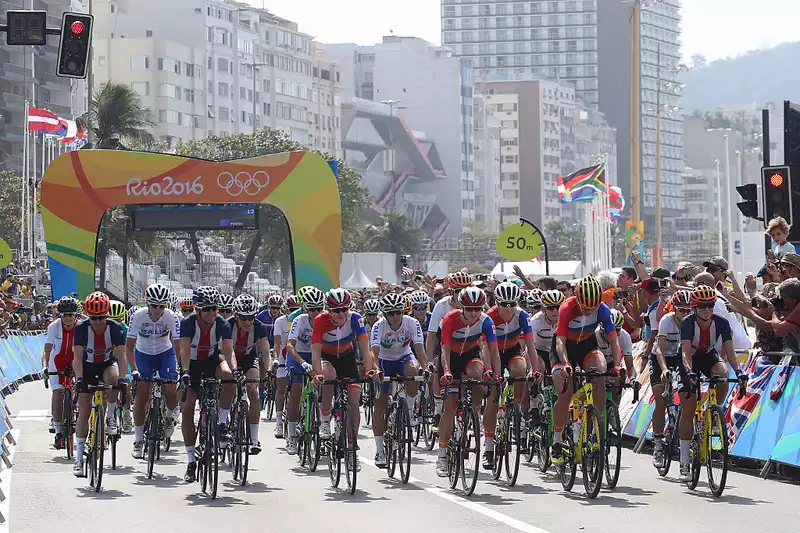The UCI announced Monday that men and women will be fully equal in the number of cyclists for the 2024 Paris Olympics. A total of 514 athletes, 257 men and 257 women, will compete in the five disciplines of road, track, MTB, BMX, and BMX Freestyle Park. The most significant change is in the elite men's and women's road races, where 90 athletes will participate in each event for the first time in Olympic history.
The changes were confirmed via a UCI press release on Monday following a meeting of the International Olympic Committee (IOC) Executive Board to discuss and approve the Paris Olympics competition program.
Last November, the UCI announced the number of athletes qualified by their national Olympic committees for the road events at the Tokyo Olympics, which were postponed until 2021 due to the COVID-19 epidemic. There were 130 slots for the elite men's road race and only 67 slots for the women's road race. This represents an alarming but historic lack of equality, and many questioned the UCI's commitment to equality in professional cycling, but the sport's governing body promised to work toward quota equality for the 2024 Games.
At the Paris Olympics, a total of 180 quotas will be allocated for the cycling road race, 17 fewer than at the Tokyo Games. However, these slots will be redistributed and divided equally between the men's and women's elite races, with 90 athletes in each discipline.
"It gives me great satisfaction that we have achieved an important goal of our Agenda 2022," UCI President David Lapartiento said in a press release Monday. The "gender equality at the 2024 Paris Olympics sends a strong message to athletes and to society as a whole that the UCI has a policy of equal representation of men and women, both in competition and in governance.
"Among other developments, following the introduction of a minimum salary for professional women riders, this is another major step forward in giving due recognition to our Federation and our sport, of which I am particularly proud. I would like to thank the IOC for their support at a time when International Federations must work hard to adapt the organization of the Olympic Games to the demands of the times.
When Connie Carpenter of the United States won her first gold medal in the women's road race at the 1984 Los Angeles Olympics, she competed in a field of 45 women, while her compatriot Alexi Grewal won gold in a field of 135 men At the 2004 Athens Olympics, the road event recorded the largest field with 200 men and 67 women competing.
For next summer's Tokyo Games, 130 men will compete on a 234-km course from Musashino no Mori Park to the finish line at Fuji Speedway. The course includes the Doshimichi road, Kagosaka Pass, and the outer rim of Mt. Fuji, with a total climbing distance of 4,865 meters.
Meanwhile, 67 women will compete, unchanged from 2004. The women's race, on the other hand, will consist of 67 runners, unchanged since 2004, and will cover the same 137 km from Musashino Forest Park to Fuji Speedway. The women's course does not cross the iconic Mt. Fuji, but includes the Donushi Kaido Road and the Kagosaka Pass climb, for a total climbing distance of 2,692 meters.
Equal quotas for road and track events were not achieved before the Tokyo Olympics, but the UCI promised to achieve equality in all five disciplines by the 2024 Paris Olympics.
Along with road events, gender equality was also achieved in track events for the Paris Games. The difference in the number of slots for track events at the Tokyo Games was 98 men and 91 women. However, at the Paris Games, the number of men and women will be 95 each, making them equal.
The change was due to the allocation of seven additional slots for women's team sprint participants, increasing the number of athletes on the women's sprint team from two to three, the same as the men's team. A further step toward gender equality had already been taken with the introduction of the women's Madison at Tokyo 2020.
The Tokyo Games will feature 38 men and 38 women each in the mountain bike competition, 24 men and 24 women each in the BMX race competition, and 9 men and 9 women each in the BMX freestyle park competition.
At the Paris Olympics, the gender parity in these three events has been maintained, but the number of slots for mountain biking has been reduced by four, to 36 men and 36 women each. On the other hand, the number of slots for BMX Freestyle Park has increased by 6 to a total of 24, with a total of 12 men and 12 women competing.
"Paris will be the first time that gender equality will be achieved in all disciplines," said Caterina Nash, UCI Governing Board member, Olympian, and multiple medalist at the UCI World Championships in cyclocross and mountain biking, as President of the Athletes' Commission. Katerina Nash said.
"I have been looking forward to a larger women's field in the Games for quite some time, and to hear that the 2024 Games will feature an equal number of men and women is great news and a very important step forward for the sport of cycling," Nash said
"I am very excited to see the field grow.
"We have seen amazing growth in all the women's disciplines, along with impressive competition. The Olympics can enhance everyone's career and create more opportunities not only for athletes who are racing now, but also for those who dream of being a part of this sport in the future."
.

Comments